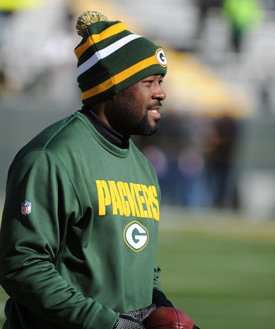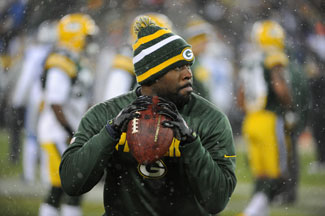Joe Whitt, Jr., NFL Coach
By Kathy Crockett

Photo by Jim Biever/Green Bay Packers
“I think that’s one thing that dyslexia gives me. It gives me the ability to think outside of the box. I think that’s one reason my players play so well. I give them the traditional teachings of football, but then I say, ‘Let’s learn it a different way.’”
Joe Whitt, Jr., is a teacher at heart. He has a true understanding that people learn differently, and therefore need teachers who can alter teaching styles to get the best out of their students—or in Whitt’s case, his players. Perhaps this comes from following in the footsteps of his father, a coach for Auburn University’s football team for 25 seasons. Or perhaps it stems from an early struggle with, and overcoming of, dyslexia, where he was spurred along by a standout teacher-tutor and the ascertainment of how to learn and advocate for himself.
Whitt, former cornerbacks’ coach for the Green Bay Packers, has a transformative approach to coaching that helped to garner a 2010 Super Bowl win, as well as a 2009 NFL Defensive Player of the Year award for Charles Woodson and Pro Bowl entrees for Woodson and another player he coached, Tramon Williams. In 2019, Whitt was picked up by the Cleveland Brownas as pass game coordinator and secondary coach. What does Whitt’s unique approach involve? Well, in part, it has to do with what he does in the off-season. It is then you’ll find him returning to his hometown of Auburn, Alabama, and shadowing public school teachers to learn from them how to most effectively access his players and get them playing their best.
“I shadow a lot of high school teachers,” Whitt explains. “I like to shadow an AP teacher and a teacher who has special-needs kids, because the students have different learning styles. That way, when I’m in the meeting room or the classroom, I’m able to reach everybody in there—from the guys who have a very strong background in football and defensive package, to guys who’ve never really played the position before, and are learning everything from the beginning. I took the idea from Mike Tomlin a couple of years ago. It’s probably one of the best things that I’ve done because it gives me a number of different teaching styles to get to my players.”
“I think my parents did a great job of getting people to help me—especially a teacher, Ms. Betty Wingo, who was just amazing….She gave me the confidence to not be afraid of being wrong, not to be embarrassed by not being able to spell some things, and not being able to read on level with the other kids. She gave me the confidence to know that I was smart. I give her a lot of credit for the success I have had.”
So every year, Whitt returns to his old high school and sits in the back of the classroom to observe teachers at work. “There are no better teachers than high school teachers,” he says. “With an AP class, it’s pretty much driven from the students. When you get to the lower-level class, the teachers drive the classes, but they get the students involved and make them feel like they’re driving, although the teacher’s the one who is organizing everything. I’ve done that every year and it’s really helped me. I’ve been around a lot of great teachers.”
For a dyslexic, you’d think that school would be the last place he’d want to return. Yet, for Whitt, school was a place where he learned confidence, strategies, and how to advocate for himself. The very high school where he returns to is the one where he was a student, an athlete, and a leader—he was president of the Athletic Club, Class President, and School President. He won the National Honor Society Award and was also honored as the top senior student athlete.
Whitt’s success story all started with an early diagnosis. Young Joe’s parents saw he was having difficulty in his early school years, and pushed for identification and intervention. “In elementary school, my parents saw that I had the issues,” explains Whitt. “They held me back in kindergarten. I had a very hard time in reading. I was always good in the other subjects, but I couldn’t read and I couldn’t spell very well.” He was one of the lucky ones, however. Between early identification and a great team supporting him, Joe got his grades up, and most importantly, his confidence.
“I think my parents did a great job of getting people to help me—especially a teacher, Ms. Betty Wingo, who was just amazing. Actually, I believe she brought me to where I am because she gave me the confidence to not be afraid of being wrong, not to be embarrassed by not being able to spell some things, and not being able to read on level with the other kids. She gave me the confidence to know that I was smart. I give her a lot of credit for the success I have had.”

Photo by Jim Biever/Green Bay Packers
Not everyone was so understanding and encouraging, but ever the leader and the optimist, Whitt has a positive spin on it in the end. “In fifth grade it got to the point where a teacher told me that I’d never be able to spell. She was correct, but I don’t think you should tell a fifth grader that. Although it motivated me—I made a 98 in spelling that year just to prove her wrong. I’m not a great speller now; I’m not a great reader now, but that’s also helped me to develop some other skills.”
“In college I pretty much had all the books on tape, so I could listen to them,” he explains. “I had other services that were given to me that I didn’t necessarily use, but the one that I used the most was having the books on tape so I could hear them. I have a pretty good memory, so once I hear something, then I understand it.”
And, somewhat indirectly, he discovered how he learned, and he discovered how to advocate for himself. “When I got into the ninth grade, I just told my teachers that, ‘I’m not reading in class, so don’t call on me.’ At first it was a struggle with some teachers because they didn’t know me. They didn’t want a kid telling them what to do. But I wouldn’t read in class because I wasn’t going to sit there and embarrass myself. I told the teachers, ‘I’m going to do the work. I’m going to make good grades, but I’m not going to read in class, so just skip over me.’ I did that from ninth grade until I graduated from college. It became easier once they saw that I was a class officer and I wasn’t trying to be defiant. At that point, I wasn’t in the special education program, and so they didn’t necessarily know why I didn’t want to do it.”
“The misconception is that if you can’t read, you’re not smart. Well, that’s the furthest thing from the truth. You have a difficulty with reading. It’s not going to be as smooth as some others, but that doesn’t mean that you’re not smart.”
Indeed, as other intelligent dyslexics have experienced, Joe’s accommodations plan was taken away, “because I was making such good grades. I was out of the program all the way through high school. When I got into college, the first day I went to Spanish, I realized I really needed to get back into (academic support) services. So I was retested back in to the learning-disabled services.”
In addition to studying and going to class, Whitt continued with his passion, football. He lettered twice as a walk-on wide receiver at Auburn University, but a series of injuries and operations changed his role from football player to football coach. He became a student coach’s assistant, and represented his sport, and his university, in a number of honors, including being on the Auburn University Student Athlete Advisory Committee and a Southeastern Conference representative for the NCAA, as well as representing students on the Minority Opportunity and Interest Committee, and presenting to the Knight Commission to talk about the state of sport (and in his case, football) in D.C.
“It’s important for the young kids to know that you can learn so much from books—even if you’re not necessarily reading from books, but getting them on tape. That’s the great thing about technology now—you can get whatever you need and you can go through books and expand your mind. It gets you thinking outside of the box.”
His leadership and achievements have continued to this day, and there is no doubt that Joe Whitt, Jr., is making an impact, both on and off the field. He was a part of the “Geek the Library” project, a public awareness campaign aimed at spreading the word about the growing role of public libraries in communities, and the funds they need to stay open. Whitt’s motivation for this campaign is to encourage young people to read, and to show that reading is cool. “You can be an athlete, and all that, and still enjoy reading,” he says.
“One of the main reasons why I wanted to be a part of it is that I have three kids. I want my son, who is dyslexic and having issues with reading, to know that ‘Daddy is going to make the effort to read to you as much as possible.’ The same thing with my daughters. And so, it’s important for the young kids to know that you can learn so much from books—even if you’re not necessarily reading from books, but getting them on tape. That’s the great thing about technology now—you can get whatever you need and you can go through books and expand your mind. It gets you thinking outside of the box. And I’m a real believer in that.”
“The world needs to know that there are success stories with people who have dyslexia.”
His out-of-the-box approach worked for his whole team—the Packers’ cornerbacks have a league record in the most interceptions during Whitt’s tenure—and for the individual players he coaches. Take it from Pro-Bowler, and one of Whitt’s former players, Tramon Williams: “Trust me,” he told the Milwaukee Journal Sentinel’s Bob McGinn. “The guy knows his stuff. He will be a coordinator or a something one day. I don’t know exactly when it’s going to be, but I think he’s definitely going to have one of those upper spots.” And that is exactly what Whitt is going for, although he’s been told that disclosing his dyslexia would derail that dream of becoming head coach. “I’ve had people tell me, before I came out with it, ‘Joe, you’re not going to get a head coaching job if people know this.’ My stance was, ‘Well, if that’s the reason somebody doesn’t hire me as a head coach, well, shame on them,’ because I think the world needs to know that there are success stories with people who have dyslexia.”
Whitt has never been afraid of the truth, or hard work. He learned it early on in school and from his parents. “My parents aren’t big on excuses. They believe in hard work. No matter what learning disabilities or anything you have, if you work hard, they feel that you can get the results. And I agree with that. I had to do some things differently. I had to really use my ability to memorize and go that route, other than just sitting there and reading things.”
His advice to parents—and teachers: “If we can give kids just a little bit of pushing, you’ll get the best out of them,” he says. “I believe that it first starts with the parents. I was blessed. I have great parents. Not only did I have great parents, I had a great core around me—my aunts and uncles—who really supported me. That’s the number one thing I really want parents to understand, because a lot of parents are afraid to say that their kids need help, especially in the black community. If my parents had been afraid to do that, I wouldn’t be where I am. They got me the help. They found Ms. Wingo for me.”
He wants all kids to remember that, “It’s cool to be smart; it’s cool to make great grades. It’s cool to think outside of the box and creatively. You don’t necessarily go with what somebody gives you; you can come up with something yourself.” Whitt credits his dyslexia for his own creativity. “I think that’s one thing that dyslexia gives me. It gives me the ability to think outside of the box. I think that’s one reason my players play so well. I give them the traditional teachings of football, but then I say, ‘Let’s learn it a different way.’ We have so many different endings we look at that aren’t traditional ways, but it allows us to see plays in a way that we can just react. In the five years I’ve been here, we’ve intercepted more balls than any team, any cornerback group, in the NFL. I think a lot of that is because of the training we do in the meeting room, in the classroom.”
“You have to find what your gift is and maximize that. You still have to work on your weaknesses—but lean on your strengths and make those things overcome your weaknesses. I just can’t stress it enough: you need to believe in yourself and understand that you are smart, even though you have this disability.”
Whitt feels that young people with dyslexia need to know that they have strengths and they are smart. “The misconception is that if you can’t read, you’re not smart. Well, that’s the furthest thing from the truth. You have a difficulty with reading. It’s not going to be as smooth as some others, but that doesn’t mean that you’re not smart. It’s going to be frustrating at times. There will be times where you’re embarrassed, that you wonder why this is happening to you. You wonder why you can’t get it like everybody else. But the thing is, God has given you a gift and you have to find what your gift is and maximize that. You still have to work on your weaknesses—but lean on your strengths and make those things overcome your weaknesses. I just can’t stress it enough: you need to believe in yourself and understand that you are smart, even though you have this disability.”
Related

Meryl Davis, Olympic Gold Medalist in Ice Dancing
By the time ice dancer Meryl Davis arrived at the 2014 Sochi Olympic games, only being the best in the world would do. Along with partner Charlie White, Davis danced a dramatic, daring routine to the music of “Scheherazade,” the Arabian Nights tale of seduction.
Read More
Brent Sopel, Former NHL Hockey Player & Sports Commentator
Brent Sopel is a shot-blocker, and he blocks them so well he helped the Chicago Blackhawks bring home the National Hockey League Stanley Cup in 2010—Chicago’s first cup in nearly half a century.
Read More
Sir Jackie Stewart, World-Champion Race Car Driver
He is a three-time world champion race car driver who worked incredibly hard to make his name, but could not spell it. In his active racing years, J-A-C-K-I-E S-T-E-W-A-R-T would become synonymous with high-speed daring, glamorous globetrotting, and charismatic celebrity. But few knew what drove perhaps the most driven race car driver of all time. It was the one thing “the master of going faster” could not outpace—even at 170 mph—the shame of his dyslexia.
Read More